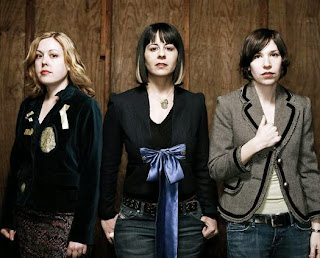 |
| Sleater-Kinney/Credit: Treble Zine |
Rookie is an online magazine aimed at teenage girls that discusses topics such as pop culture, fashion, social issues, and, of course, feminism. Rookie is often compared to Sassy, which as discussed in a previous entry, was one of the inspirations for the riot grrrl movement. Founder of Rookie Tavi Gevinson even discussed her love and inspiration for the riot grrrl movement, specifically Kathleen Hanna, in the documentary about Kathleen Hannah, The Punk Singer. In describing feminism, Tavi Gevinson states "feminism to me means fighting. It's a very nuanced, complex thing, but at the very core of it I'm a feminist because I don't think being a girl limits me in any way." Below is a picture of Tavi Gevinson posing with an archive of Rookie's posts from its first year entitled Rookie: Yearbook One.
 |
| Rookie Creator Tavi Gevinson with Rookie: Yearbook One/Credit: Westervin |
Aside from these individuals, many current bands were also inspired by the riot grrrl scene. Beth Ditto from the indie-rock band, The Gossip, is perhaps one of the most well-known. Beth Ditto is the lead singer of the band, The Gossip, and is a major media figure known for her candid support for LGBTQ and feminist issues. In reference to the riot grrrl scene, Ditto stated in the foreword to Riot Grrrl: Revolution Girl Style Now: "Until I found riot grrrl, or riot grrrl found me, I was just another Gloria Steinem NOW feminist trying to take a stand in shop class. Now I am a musician, a writer, a whole person." Below is a picture of Beth Ditto performing with her band, The Gossip.
 |
| Beth Ditto of The Gossip/Credit: After Ellen |
Another way riot grrrl has lived on is through archives. The collection entitled "The Fales Riot Grrrl Collection" has been stored in New York University's Fales Library and Special Collections beginning in the fall of 2010. According to the Riot Grrrl's Fales Library and Special Collection website, the main purpose of the collection is "to collect unique materials that provide documentation of the creative process of individuals and the chronology of the movement overall." Numerous former riot grrrl participants have donated to the collection including Kathleen Hanna, while several other key riot grrrl members such as Molly Neuman, Allison Wolfe and Carrie Brownstein are expected to donate materials in the near future. Although these archives cannot mimic the riot grrrl experience, they do provide viewers with insight and knowledge into the riot grrrl phenomenon.
